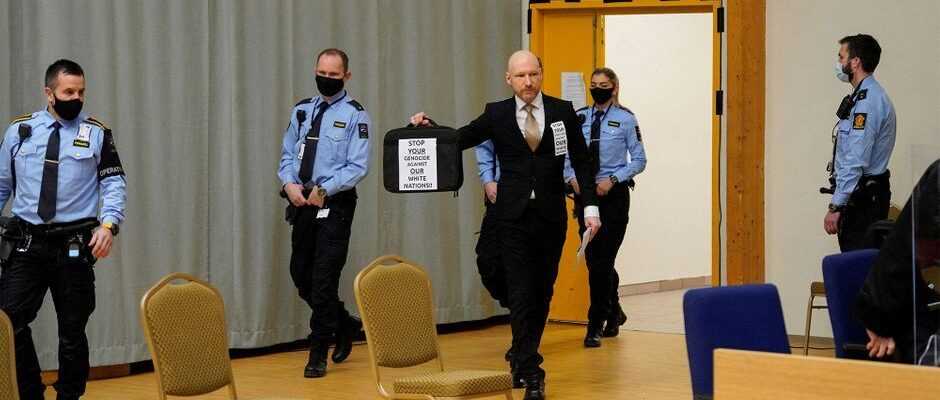Ten years after having killed 77 people in Norway, the right-wing extremist Anders Behring Breivik pleads this Tuesday for his release, a procedure a priori doomed to failure which he began with a Nazi salute in front of the judges.
Ten years after having killed 77 people in Norway, the right-wing extremist Anders Behring Breivik pleads this Tuesday for his release, a procedure a priori doomed to failure which he began with a Nazi salute in front of the judges. If the outcome of the three-day procedure, relocated for security reasons to the gymnasium of the Skien prison (south) where he is imprisoned, seems to be a foregone conclusion, survivors and relatives of the victims fear that Breivik will make it a political platform .
The right-wing extremist, now 42, was sentenced in 2012 to 21 years in prison with the possibility of extension, accompanied by a minimum sentence of ten years – the maximum at the time. On July 22, 2011, he first detonated a bomb near the government headquarters in Oslo, killing eight people, then killed 69 other people, mostly teenagers, by opening fire on a summer camp of the Labor youth on the island of Utøya. Customary of outbursts and provocations, Breivik, shaved head and goatee, entered the courtroom, a sign on his briefcase and on his dark suit, briefly addressed the journalists then gave a Hitler salute to the arrival of the three judges. “As in any other rule of law, a convict has the right to apply for parole and Breivik has decided to make use of this right,” his lawyer, Øystein Storrvik, told AFP before the hearing.
Test for the rule of law
In a country that had not seen such violent crime since the Second World War, the request for parole has, in the general opinion, no chance of succeeding. But it is seen as a test that the rule of law — which Breivik had tried to destroy — must overcome by treating the extremist like any other litigant. “It is a hardship for all of us that a person who has killed children, hunted down people who were fleeing in order to kill them and who shot people who were pleading for their lives, also benefits from the liberal aspects of justice “, wrote the popular newspaper Verdens Gang in an editorial on Tuesday.
“He must have the rights that a rule of law gives him. Not for his good, but for ours. No terrorist must be able to change our model of governance and the legal rights that apply to all Norwegian citizens”, underlined- he. In 2016, Breivik, who has three cells in prison, a television with DVD player and game console and a typewriter, succeeded in having the State condemned for “inhuman” and “degrading” treatment in reason for keeping him apart from the other detainees. The judgment was overturned on appeal.
Misuse of justice?
In the courts or in letters, notably to AFP, Breivik has in the past said he renounced violence, even comparing himself to Nelson Mandela, but he never expressed credible remorse “He in no way distanced himself from the mass killing he committed and which he considers totally legitimate,” argued Tore Bjørgo, director of the Center for Research on Right-wing Extremism (C-REX) at the University of Oslo.
Broadcast live – with a slight delay to interrupt the most provocative passages – the procedure begun on Tuesday risks once again being hijacked for propaganda purposes, in accordance with what Breivik professed in the “manifesto” that it broadcast before the attacks. Before the hearing, the family support group said it “encouraged placing as little attention as possible on the terrorist and his message”. “I find it rather absurd that he is allowed to receive so much attention by asking for his release after only ten years,” association president Lisbeth Kristine Røyneland told NRK radio. The 2011 attacks inspired other attacks, including that of Christchurch in New Zealand in 2019, and planned attacks around the world.
Any reproduction prohibited
